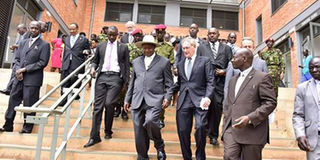Museveni launches state-of-the-art cancer institute

What you need to know:
The increase was attributed to increased cancer awareness, changes in life style and HIV. Cancer screening at UCI, done every Wednesday and Friday involves more than 200 patients daily.
Kampala.
President Museveni yesterday launched a state-of-the-art UCI-Fred Hutchinson Cancer Centre at Mulago hospital where 20,000 cancer patients are set to get free treatment.
At the same function, the President committed to establishing cancer screening centres at the lowest level of treatment such as the sub-county if Uganda is to combat the ever increasing cancer cases and deaths.
Mr Corey Casper, the head of the Fred Hutchinson Global Alliance, said the facility will be treating more than 20,000 cancer patients in a year free of charge.
“The training programmes aim to build human resource capacity by training the next generation of Ugandan oncologists, infectious diseases specialists, other practitioners and related professionals and researchers,” Mr Casper noted.
Mr Museveni said cancer can be neutralised once it is detected early.
“I have learnt that cancer has got four stages and in order to be neutralised it is good to have it detected early and it can only be detected through routine screening,” Mr Museveni said.
He added: “Simplicity is part of the success plan. If it’s not technically impossible, the sub-county should be the nearest unit of getting cancer screening.”
Mr Museveni noted that the new treatment centre has added on the capacity of the Uganda Cancer Institute (UCI) in advancing treatment and care.
“What we are celebrating is the capacity of the laboratory which will be looking at the blood, cells and tissues,” Mr Museveni noted.
While thanking the Fred Hutchinson Cancer Centre Alliance and the US government for their support, Mr Museveni asked the Ministry of Health to focus on preventing the diseases contributing to the cancer burden.
The new cancer out-patient treatment and research centre was constructed by the Fred Hutchinson Research Centre (Fred Hutch) in partnership with UCI, with financial assistance from United States Agency for International Development (Usaid).
US Ambassador Scott DeLisi said the world class facility cost $1.5million (Shs4.5b) and will provide cancer treatment, care and research.
The new state-of-the-art research and out-patient cancer center sits on 25,000 square feet and will house an out-patient clinic, chemotherapy infusion rooms, research laboratories, training and data centre
At the launch, Dr Chris Baryomunsi, the State minister for Health ,noted that there are increasing rates of non-communicable diseases in the country. However, he noted that the ministry is aware why the cancer cases are on the rise.
“We have increased capacity in terms of space, capacity to diagnose and treat cancer cases. We want to encourage Ugandans to always go for regular checkups even if they are feeling healthy,” Dr Baryomunsi said.
Prof Charles Olweny, the chair to the UCI board, said the cancer institute is working on a referral system which will ensure that cancer patients who do not manage to get treatment in Uganda are flown out of the country.
about the cancer institute
The Uganda Cancer Institute (UCI) was established in 1967 on Mulago hill with 18 beds as a lymphoma Treatment Centre to treat childhood lymphomas, commonly known as Burkitt’s lymphoma suffered by children in Uganda. It currently has 80 beds for in patients.
More than 2,800 new cancer cases were registered in 2012 up from 1,800 in 2011.
The increase was attributed to increased cancer awareness, changes in life style and HIV. Cancer screening at UCI, done every Wednesday and Friday involves more than 200 patients daily.
More than 70,000 patient visits were registered with UCI at the end of 2014. The institute is currently an 80-bed capacity. It serves patients that come from as far as Djibouti, Eritrea, Somalia, western Kenya, Rwanda, Burundi, South Sudan and the eastern Democratic Republic of Congo.
The global burden of cancer is estimated to increase by nearly 70 per cent by 2030 and more than two-thirds of all deaths occur in low middle-income countries, according to Mr Corey Casper, the head of the Fred Hutchinson Global Alliance.



